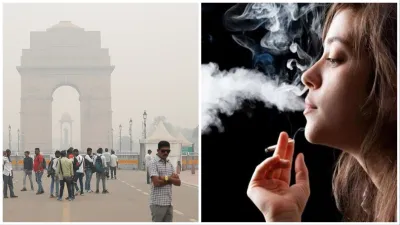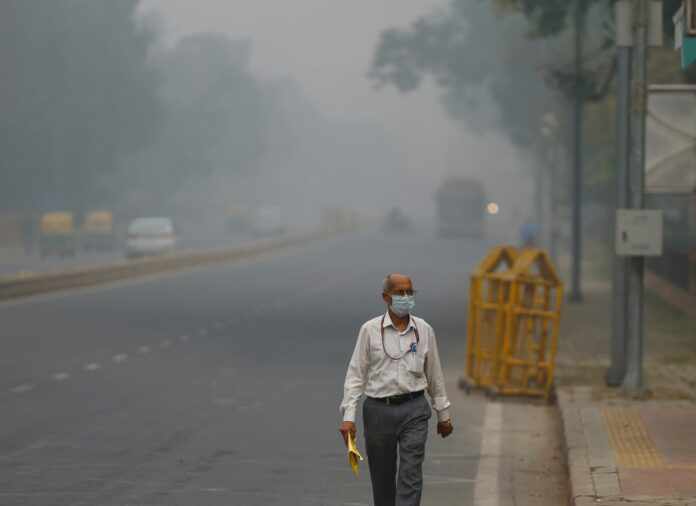Delhi’s Alarming Pollution Levels Compared To Smoking
If you are residing in Delhi, you might as well be chain-smoking. A staggering new study has revealed that breathing in Delhi’s air equates to smoking a shocking 40 cigarettes every single day. This startling comparison is drawn from the high levels of PM 2.5—a dangerous particulate matter prevalent in the city’s atmosphere, pushing it into the hazardous pollution category.
How Other States Compare In Air Quality?
Delhi’s pollution levels are the worst in the country, but other states are also grappling with alarming figures. Haryana residents inhale air equivalent to smoking 29 cigarettes daily. Bihar fares slightly better at 10 cigarettes, while Uttar Pradesh’s count stands at 9.5.
In Rajasthan, West Bengal, and Odisha, individuals breathe air equal to smoking 7.5 cigarettes daily. Punjab clocks in at 6.5 cigarettes, and Madhya Pradesh shows slightly lower levels at 5.5 cigarettes. Across the country, the national average hovers around 8 cigarettes daily, highlighting the dire situation of air pollution throughout India.

PM 2.5: The Silent Killer In India’s Air
Particulate Matter 2.5 (PM 2.5) refers to tiny particles in the air, 2.5 micrometers or smaller, capable of penetrating deep into the lungs and entering the bloodstream. Prolonged exposure to PM 2.5 has been linked to respiratory issues, cardiovascular diseases, and even premature death.
Delhi consistently reports some of the highest PM 2.5 levels globally, with toxic air turning into a recurring public health emergency during winter. Stubble burning, vehicular emissions, and industrial pollution are among the primary contributors to these alarming figures.
National And Global Repercussions
India’s pollution crisis has drawn global attention. The World Health Organization (WHO) has consistently listed Indian cities among the world’s most polluted. The adverse effects of breathing polluted air extend beyond immediate respiratory issues; they also result in reduced life expectancy, stunted lung growth in children, and increased cases of asthma.
As India’s cities continue to expand and industrialize, the pollution crisis shows no signs of abating. This situation has significant implications for India’s healthcare infrastructure, with rising pollution-related illnesses exerting pressure on hospitals and medical services.
The Call For Stringent Measures
Experts have long called for stricter measures to combat pollution. Suggestions include improving public transport infrastructure, transitioning to cleaner energy sources, and imposing stricter penalties for industries violating emission norms. Implementing robust air quality monitoring systems and public awareness campaigns could also go a long way in addressing the crisis.
How To Protect Yourself From Air Pollution?
While long-term solutions require systemic changes, individuals can take steps to protect themselves from the immediate effects of pollution:
- Use Air Purifiers: Invest in high-quality air purifiers for indoor spaces.
- Wear N95 Masks: These masks can filter out PM 2.5 particles, offering protection when outdoors.
- Monitor Air Quality: Keep track of air quality levels using apps and limit outdoor activities during high pollution periods.
- Plant Indoor Greens: Certain indoor plants, such as peace lilies and snake plants, can help improve air quality at home.

A Grim Reality That Demands Action
The fact that breathing air in certain Indian cities is equivalent to smoking multiple cigarettes daily underscores the urgency of addressing pollution. As cities grow, ensuring clean air should be a top priority for policymakers and citizens alike. The current scenario paints a grim picture of health risks that could have lasting repercussions for generations to come.
India stands at a critical juncture, where taking decisive action against pollution could save countless lives and improve the quality of life for millions. The time to act is now.

